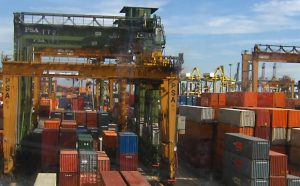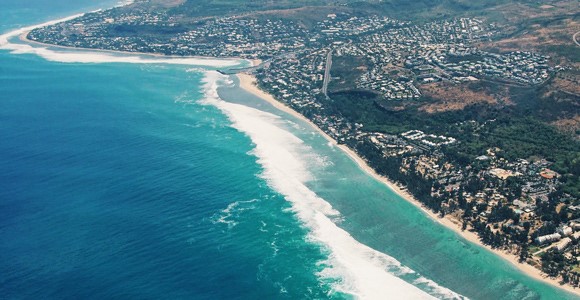Moving well to Reunion
Reunion Island has always appealed to metropolitan residents. Its climate, its sensational landscapes, the warmth of its people, everything seems to be done to attract us, doesn’t it? So, when you decide to take the plunge and move, for a shorter or longer period, how do you go about it? What should you know about Reunion Island so as not to miss your move?
Concrete advice when you arrive in Réunion
Moving to Reunion Island is not a solution that can be improvised overnight, it is important to prepare beforehand. The first thing to do, in the first days of your arrival (or from the mainland if you can) is to transfer your bank account in order to facilitate day-to-day operations. Indeed, know that the checks of the metropolis are less accepted today because of wooden checks issued by metropolitan holders. You can very well transfer your account to another branch of the same bank, it is an automatic procedure which allows you to keep the same account number.  Moving to Reunion Island also implies that you take out a new telephone subscription. On the island, two operators share telephone coverage, namely Orange Réunion and SFR Réunion which offer attractive packages. If you want to keep the same package, operators often offer facilities to go in this direction. Some telephone shops also offer telephone cards. The currency on Reunion Island remains the euro of course. Payment cards are accepted everywhere and you can withdraw cash under the same conditions as in mainland France, except in the Cirque de Mafate.
Moving to Reunion Island also implies that you take out a new telephone subscription. On the island, two operators share telephone coverage, namely Orange Réunion and SFR Réunion which offer attractive packages. If you want to keep the same package, operators often offer facilities to go in this direction. Some telephone shops also offer telephone cards. The currency on Reunion Island remains the euro of course. Payment cards are accepted everywhere and you can withdraw cash under the same conditions as in mainland France, except in the Cirque de Mafate.
What budget to live in Reunion?
On the catering side, it is in the Creole establishments where you find the cheapest dishes and, in addition, they are very generous. Another solution is take-out. On the other hand, everything related to fish restaurants or tourist establishments is more expensive. For transport, we recommend that you take the bus, as the island is relatively well served. However, without a car, it is impossible for you to discover the riches and the magic of Reunion’s sometimes lunar landscapes.  For accommodation – especially during the first days in Reunion – you may be staying at the hotel, the time to find your bearings and have permanent accommodation. Many hotels on the island modify their rates on the Internet according to the occupancy rate or else offer reduced rates at certain periods. As a general rule, we estimate a cheap hotel in Reunion for less than 40 euros per double room (or 15-20 euros per night per person). This corresponds to youth hostels, stopover lodges or pensions. Average prices vary more between 60 and 80 euros while fancy hotels start from 80 to 100 euros per night.
For accommodation – especially during the first days in Reunion – you may be staying at the hotel, the time to find your bearings and have permanent accommodation. Many hotels on the island modify their rates on the Internet according to the occupancy rate or else offer reduced rates at certain periods. As a general rule, we estimate a cheap hotel in Reunion for less than 40 euros per double room (or 15-20 euros per night per person). This corresponds to youth hostels, stopover lodges or pensions. Average prices vary more between 60 and 80 euros while fancy hotels start from 80 to 100 euros per night.
Settle in Reunion
Deciding to move and settle in Reunion without having an attachment, no friends or family or even no job is quite difficult. Housing, the cost of living and employment are as difficult as in mainland France. Average property prices are higher than those in mainland France, while the energy cost is identical to that in mainland France. However, this cost of living turns out to be higher, in particular because of food (imported products). Thus, living and moving in Reunion is a very strong experience. Indeed, the island is a true model of “good manners together”, each one helps each other, is tolerant and respectful of the others. The Reunionese are proud of their traditions and they want to share them with you so that you can integrate them into your daily life. Once we become aware of all this, we can then think about the move itself..
Moving
For those who choose air freight, be aware that the cost is very expensive, which is why we strongly advise you to turn to sea freight. For maritime transport, there are several options for moving to Reunion Island from the mainland. Indeed, depending on the volume of your business, but also its nature (furniture only? Vehicle? Personal effects?), Your place of departure and especially the budget allocated for the move, it is almost possible to organize your move to the card via sea transport.  Concretely, you can organize yourself as follows: • From the port of departure to the port of arrival in Réunion • From your home at the port of arrival on the island • From your home of departure to the home of arrival ( with an option for dismantling the furniture)
Concretely, you can organize yourself as follows: • From the port of departure to the port of arrival in Réunion • From your home at the port of arrival on the island • From your home of departure to the home of arrival ( with an option for dismantling the furniture)
Upstream preparation
A move like the one to Reunion Island is not decided on a whim and its organization is essential, because it is well thought out. In addition to the usual paperwork to deal with, you must also remember that your move will be carried out by sea in particular. You have to rely on availability for this. For a departure to Reunion, the ports of Nantes, Le Havre, Rouen, Bordeaux and Marseille are privileged places. Depending on the shipping company you choose, the transit time varies between 5 and 8 weeks, not to mention the time needed to obtain the necessary documents for customs formalities. In short, it is estimated that it takes between 2 and 3 months in advance to be sure to collect your belongings on time in Reunion. If you have any doubts or if you want to interview an international moving professional, we answer all requests at ADC to facilitate your move.
The cost of moving to Reunion
No move is the same and that is why the prices for transporting your belongings from the mainland to Réunion vary according to several parameters. Depending on the destination address, but also on the departure address, depending on the volume transported, the mode of transport chosen (container, crate, pallet, maritime transport, etc.) and especially the value of your goods, the price evolves rapidly. The best way is to request a free quote from several professional movers such as ADC or even from a sea freight forwarder. Let him know all the details mentioned above in order to get a price order for your move. As a general rule, you have to estimate between 4,000 and 10,000 euros to move to Reunion Island. The variations in prices depend on the means used and the quantity to be transported, it should be remembered.
Solutions for maritime transport
From the metropolis, there are 3 solutions to send your belongings and your car to Reunion: transport in personalized maritime container, transport in maritime groupage and transport by Ro-Ro (a ro-ro ship). For Ro-Ro transport, it is surely the most economical way to send all your belongings, including your vehicle to Reunion Island. Please note, for this type of transport, your car can only be sent from Le Havre.  For container transport, whether grouped or individual, you can load a vehicle and your personal effects in complete safety. The container is fully sealed throughout the journey to Reunion, until precisely the opening on the docks by the customs authorities. For groupage transport, here is a simple, secure and relatively economical solution than for an individual container. In fact, you only pay in proportion to the volume used. The major disadvantage is that the container leaves the metropolis once it is fully full, which can sometimes take a while. Departures for Pointe Des Galets with this type of transport are from Antwerp, Rotterdam, Rouen, Le Havre, Nantes and Marseille. For personalized transport, which takes place from your home, this is clearly the most expensive solution. However, it has a double advantage. On the one hand, you know the departure date of the container and know roughly when it will arrive safely. On the other hand, you have a container just for you in front of the pickup location of your choice.
For container transport, whether grouped or individual, you can load a vehicle and your personal effects in complete safety. The container is fully sealed throughout the journey to Reunion, until precisely the opening on the docks by the customs authorities. For groupage transport, here is a simple, secure and relatively economical solution than for an individual container. In fact, you only pay in proportion to the volume used. The major disadvantage is that the container leaves the metropolis once it is fully full, which can sometimes take a while. Departures for Pointe Des Galets with this type of transport are from Antwerp, Rotterdam, Rouen, Le Havre, Nantes and Marseille. For personalized transport, which takes place from your home, this is clearly the most expensive solution. However, it has a double advantage. On the one hand, you know the departure date of the container and know roughly when it will arrive safely. On the other hand, you have a container just for you in front of the pickup location of your choice.
Tips for moving to Reunion in peace
• Make sure you have your identity papers, as well as invoices and authorizations to transport all your material goods. If you are of French nationality, a valid passport or identity card is sufficient for the trip. Please note that there is no vaccine required or compulsory. • Find out about the traditional procedures for moving: school registration, notice to leave your home, notify the tax authorities and any social benefits organizations. Cancel current subscriptions as well as mutual insurance contracts. • Evaluate the volume of your business: you should know that non-exotic furniture purchased in metropolitan France does not support the overseas climate well. It may be prudent not to take them with you. • Negotiate the terms and conditions for the move with your company: days off, partial or total participation for expenses, moving assistance, etc. • Insure all of your goods: insurance is optional with some carriers or movers. Remember that sea or air freight can easily damage your goods or that a delay in the arrival date can easily result in additional charges.


Recent Comments